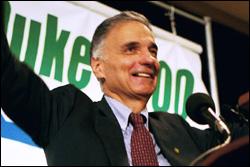
| Green Party Presidential Nominating Convention |  |
| Back
Platform Candidates Delegates More Note: Some sections of this report are still in progress. |
 |
Ralph Nader June 25, 2000 |
| Consumer advocate
Ralph Nader, he of the rumpled look and dour aspect, may turn out to be
the hip candidate of the 2000 presidential campaign. At the Green
Party Presidential Nominating Convention in Denver, Nader handily gained
the party's nomination in voting by 320 delegates from 39 states.
After a fast-paced video introduction featuring highlights from his 35-year
career, in which he has interacted with figures as diverse as Beatle John
Lennon and exercise guru Richard Simmons, Nader delivered a lengthy acceptance
speech, presenting a broadside against corporate abuses and vowing to "challenge
the campaigns of the Bush and Gore duopoly in every locality..."
While Al Gore is touting the strong economy during his ongoing "prosperity and progress" tour, Nader pointedly questioned the depth and extent of the current prosperity, noting, for example that one in five children lives in poverty and that record numbers are without health insurance. Thus a different picture arises if one uses "people's yardsticks to measure the quality of the economy, not corporate yardsticks and their frameworks." "So many of these inequities have become normalized," Nader observed. He called for "systemic approaches to systemic injustice". "A society that has more justice is a society that needs less charity," Nader stated. The United States may be held up by many as the world's greatest democracy, but Nader said it is "an underdeveloped democracy" in which "corporate commercialization of our country, our government, our universities, our schools, our youngsters, our very expectation levels continues unabated." To confront these problems and challenges, Nader hopes his campaign will spark "a progressive political movement" that brings together labor and environmentalists, retired Americans and young people and even some of the 70 million nonvoters. Nader's speech lasted, with numerous interruptions for applause, almost an hour and fifty minutes. Earlier in the day delegates had selected Nader, 66, as their nominee by a wide margin over Stephen Gaskin, 65, founder of the Farm, a hippy community in Summertown, Tennessee, and Jello Biafra, 42, the creative force behind the Dead Kennedys punk rock band. Gaskin conducted a low-key campaign emphasizing decriminalization of marijuana possession. Biafra, whose platform included many unorthodox ideas such as a maximum wage, advocated what he called the "Green Wedge;" he said he would choose death row inmate Mumia Abu-Jamal as his running mate. [The final vote was: Ralph Nader, 295 votes; Stephen Gaskin, 10 votes; Jello Biafra 10 votes; NOTA 1 vote; Joel Kovel(write-in) 3 votes]. Nader's running mate, as in 1996, is Winona LaDuke. She spoke at a reception and joined Nader for a press conference. A Harvard graduate who lives on the White Earth Indian Reservation in Northern Minnesota, LaDuke is a member of the Mississippi Band of Anishinaabeg and has been active on behalf of Native American and indigenous peoples' causes as well as writing books and articles. LaDuke advocates a "Seventh Generation Amendment" to the Constitution under which effects of government actions seven generations into the future would have to be considered. Although little known, LaDuke is eloquent, is not "another suit," and she does hail from Minnesota, the home of another atypical candidate who achieved success at the ballot box. In addition to the Nader-LaDuke ticket, more than 100 Green candidates will be on the ballot in races around the country this November. As of June 2000, 79 Greens hold elected office in 18 states and the District of Columbia; 31 of the 79 are in California. Green candidates and parties can expect to benefit from Nader's full force campaign. In 1996 he accepted the Greens nomination but did not actively campaign; his "walk" for president, in which he spent less than $5,000 and garnered 684,871 votes (0.71%), fell short of many people's expectations, although it significantly helped promote the growth of state green parties in the following years. Nader, who says he does not believe in long campaigns, only announced his candidacy on February 21, 2000. At that time the races for the Republican and Democratic nominations had been underway for more than a year. Despite the comparatively late start, Nader has already made significant headway. In the period from March 1 to June 23 he visited all 50 states. He has set a fundraising goal of $5 million, and raised about $900,000 by mid-June. He has assembled a campaign team of 37 people. He garnered the endorsement of the California Nurses Association (June 14), and he has won praise, although not endorsements, from leaders of several national unions disappointed with the Clinton-Gore administration's recent lobbying for permanent normanl trade relations with China and its earlier push for NAFTA. On June 22 Nader addressed the Teamsters' General Executive Board and appeared at a news conference with Teamsters president James P. Hoffa, who stated, "No one in the political arena speaks stronger on the issues important to working families than Ralph Nader. On May 23, UAW president Stephen P. Yokich issued a statement praising Nader as a candidate "who will take a stand based on what is right, not what big money dictates," while condemning Gore for "holding hands with the profiteers of the world." Nader is already registering at 4 to 5 percent in a number of national polls (5.7 percent in a Zogby poll of 842 likely voters from April 1-4; 4.3 percent in a Zogby poll of 1,011 likely voters from June 21) and he has also scored well in polling in several states. Although the Gore campaign professes not to be worried by support for Nader, Carl Mayer, an advisor to Nader, says Nader's presnece in the race has "totally changed the dynamic" by forcing Gore to circle back and pay more attention to states and constituencies where Nader is doing well. Mayer noted that Nader is also injecting issues into the campaign that otherwise would not be there.  |